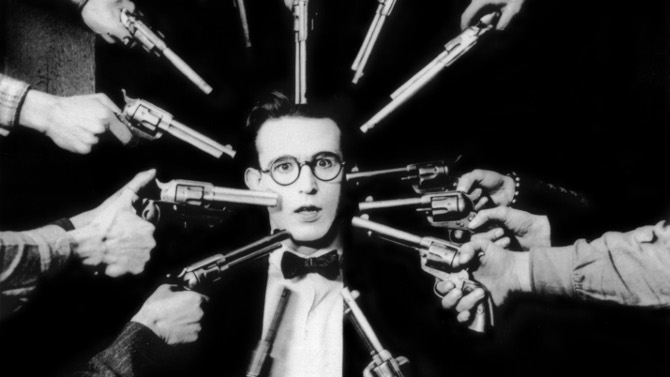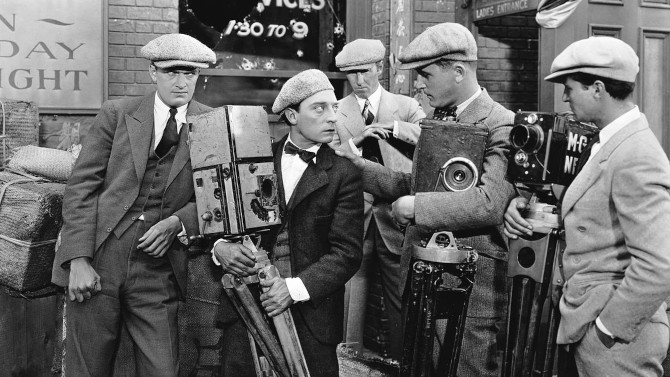
Plights, Camera, Action
Often deemed to be the last classic film made by the great Buster Keaton, The Cameraman (1928) was the final time the silent legend would have anything close to full creative control over one of his own features... as he folded his independent studio to sign with Metro-Goldwyn-Mayer (MGM) – who promptly made him their third highest paid star. Though his future would soon turn very bleak, this first film with the new studio was his own idea.
-
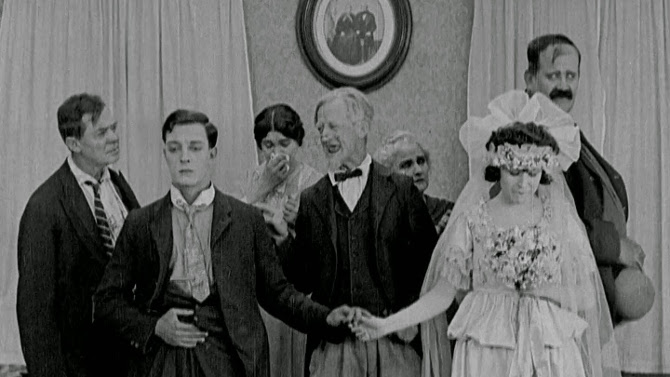
Boy Meets Girl
NeighborsDecember 6, 2017Long before Zac Efron and his fraternity bros started terrorizing new parents Seth Rogen and Rose Byrne in the 2014 comedy Neighbors, there was another movie with the same name, a superlative 1920 short from the great Buster Keaton (one of his first four shorts on his own). A tale of star crossed lovers, The Boy (Buster Keaton) and The Girl (Virginia Fox – originally one of Mack Sennett’s Bathing Beauties, she would marry major Hollywood mogul Darryl F. Zanuck, retiring from the business just a few years later) are madly in love, though the fence that separates their tenement apartments might as well be topped with barbed wire and armed with snipers, as their families despise each other – a feud rivalling the Montague’s and Capulet’s. Both fathers are especially involved in keeping the pair apart, though The Girl’s giant sized Father (Joe Roberts) is a much bigger threat than The Boy’s equally diminutive dad (played by Buster’s own father, Joe). Early each morning, they slip notes through a hole in the fence to communicate.
-
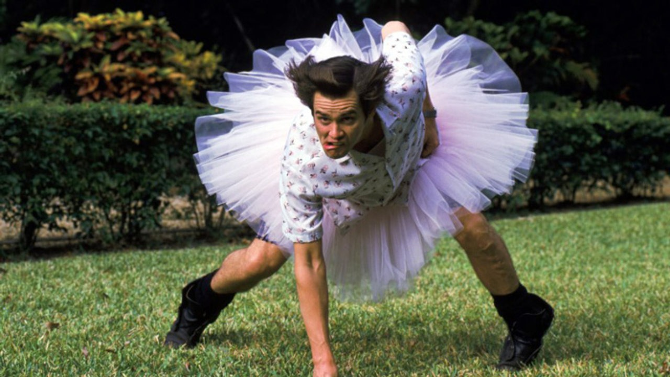
An Ace Venture
Ace Ventura: Pet DetectiveSeptember 12, 2017One of those films that was not treated overly well by critics but is beloved by fans the world over, Ace Ventura: Pet Detective, shot lead Jim Carrey, then known to people mostly for being on In Living Color, into another stratosphere. The year 1994 was a good one for the comic and actor, as this film was followed soon after by The Mask and Dumb & Dumber, further adding to his meteoric rise. The next three years would further cement him as a true comic talent, as roles in Batman Forever, Ace Ventura: When Nature Calls, The Cable Guy and Liar Liar continuously hit viewers’ funny bones. Though, it was the character of Ace Ventura, which was co-written by Carrey, along with Jack Bernstein and Tom Shadyac (who also directed, and would work again with the actor in Liar Liar and Bruce Almighty), that first demonstrated his skills at physical comedy, mimicry, comedic timing and coining memorable catch phrases to be enjoyed by silver screen audiences.
-
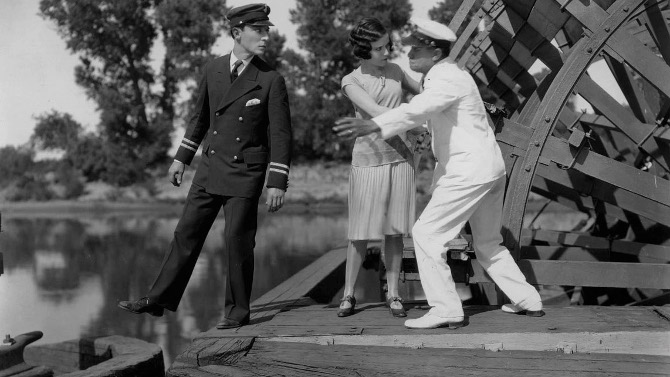
Riverboat Fantasy
Steamboat Bill, Jr.August 7, 2017An inside joke for fans of Buster Keaton, they surely know that he often wears a pork pie hat in his films. Well, while watching 1928's Steamboat Bill, Jr., there is a scene where his uncle takes him to buy a new hat – to replace the effeminate French beret that currently adorns his little head. A revolving number are tried on by the young man, with the closest to his original being wholeheartedly rejected. Though he does eventually purchase a much larger version of a pork pie hat, it flies off of his head and into the flowing river, not to be recovered. This, in many ways, is symbolic of the changing era the talented silent comedian found himself in. After the box office debacle that was The General (now considered one of his greatest features), Keaton was no longer blessed with carte blanche when making his movies – the studio keeping a keen eye on spending and limiting his overall control.
-
Harold Lloyd Hones his “Glasses” Character
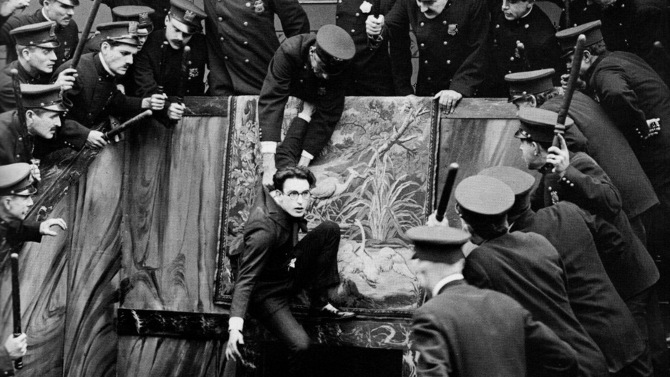 Bumping Into BroadwayAn Eastern WesternerJuly 14, 2017
Bumping Into BroadwayAn Eastern WesternerJuly 14, 2017An observation I am sure many of you have made over the years is the general stupidity (and lack of skill) the villains, police or any other nefarious enemy has had in the movies. With the James Bond films being a prime example, it shows the low standards the maniacal mastermind must have had when hiring his henchmen – they cannot shoot, drive or seemingly do anything else, stumbling over each other in the process. Also think of John Wick or any other motion picture made over the past multiple decades. Well, it was this thought that struck me as I sat watching two early silent shorts from the comedic great Harold Lloyd (placed alongside Charlie Chaplin and Buster Keaton as the top comics of the silent era). Starting with 1919's Bumping into Broadway, it was the first time the actor donned his now-famous “glasses” character, usually just referred to as The Boy. A two-reeler that lasts twenty-five minutes, it has The Boy getting into all kinds of hijinks.
-
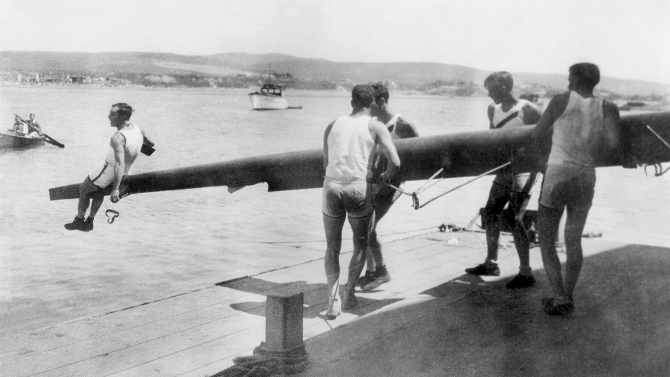
Getting on Track
CollegeJune 20, 2017Showing off his immense skills in a rather unusual way, Buster Keaton heads to College in this 1927 feature that followed up The General; a Civil War set picture that is now known as a classic (and often considered his masterpiece), its expansive story bloated the budget and somehow brought lackluster reviews, leading to a rare bust at the box office. So, his next film (the above mentioned College) was designed to be more commercially viable and Keaton was reeled in, forced to be under the thumb of co-director James W. Horne (who according to Keaton, did virtually nothing) as well as producer Harry Brand (publicity chief for Keaton’s usual producer Joseph Schenck – he had just become president of United Artists), the latter constantly scrutinized every penny Keaton spent, making sure he didn’t go over budget like with The General. Further annoying the funnyman, the producer made sure that he received a "Supervised by Harry Brand" credit on the film. Receiving another batch of ungracious reviews, it was Keaton’s second bomb in a row. Despite that, College, like The General, is considered by most today to be a classic (though more of a middling effort compared to some of his other motion pictures).
-
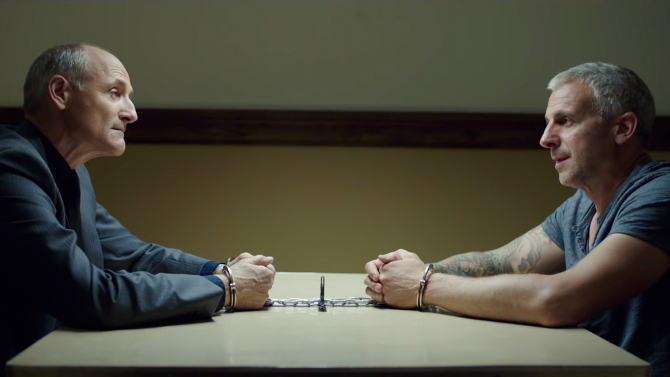
Bon Cop, Bad Cop 2 Good to be a Sequel
Bon Cop, Bad Cop 2June 4, 2017Fans of one of the most popular Canadian films of all-time, 2006's Bon Cop, Bad Cop often wondered why a sequel was never made. . . well, out of the blue, eleven years later, everyone was just as surprised when Bon Cop, Bad Cop 2 arrived in theatres, catching many off-guard – very much like the original unexpected hit. Reuniting Colm Feore and Patrick Huard once again, the former, Martin Ward, is now a senior federal officer with the Royal Canadian Mounted Police, while the latter, David Bouchard, is a provincial officer with the Sûreté du Québec. Unbeknownst to either, the former quasi-friends, who have grown apart over the years, are working the same case, though Bouchard is undercover.

